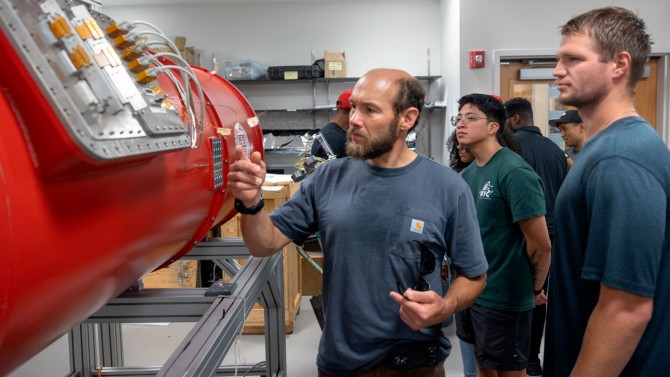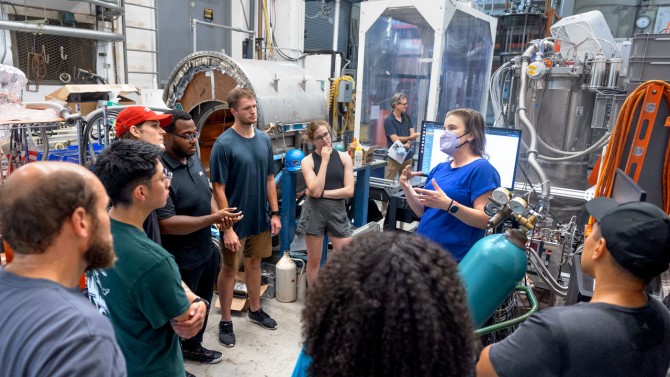
Navy veteran Tyler Parker said the Warrior-Scholar Project’s two-week academic boot camp at Cornell, which included coursework in humanities and in science, technology, engineering and math, had helped advance his goals to pursue neuroscience research.
Academic boot camp tackles mission: imposter syndrome
By James Dean, Cornell Chronicle
Dragon Tamer. Virus Hunter. Ground Breaker. Force Multiplier.
Those were some of the tag lines in the Army’s 2021 “What’s Your Warrior?” marketing campaign – the latest spin on a warrior identity the service only began promoting relatively recently, while struggling to redefine its post-Cold War mission, said Ruth Lawlor, assistant professor of history in the College of Arts and Sciences.
She discussed the phenomenon – a departure from citizen-soldier traditions – with a group of students who had lived it: active-duty and veteran service members, participants in the Warrior-Scholar Project’s two-week academic boot camp hosted at Cornell July 20 to Aug. 3.
“A warrior is an identity, the core of your being, not a job,” Lawlor said. “Is it a good idea to see the military as a separate set of people? And what might be the consequences of that approach?”
Some of the 10 students in the seminar titled “Public Service in Contemporary American Democracy” – part of a week focused on humanities, followed by one dedicated to science, technology, engineering and math – described how the warrior ethos distinguished them from ordinary civilians and bound service branches together. But as they transitioned out of military life, many also wrestled with a loss of identity.
They were eager to pursue more education, but questioned whether they belonged in college.
“Imposter syndrome is real,” said Christian Saluna, a 32-year-old Californian who ended five years of service in the Marines last fall and plans to pursue mechanical engineering. “Getting out, the prospect of college is like, ‘Am I too late? Am I good enough?’ – especially at an Ivy League university. I felt like finding that belonging and purpose and camaraderie would be hard, that I would never find people who would understand what I went through.”
Founded in 2011, the nonprofit Warrior-Scholar Project offers immersive programs on 20 college campuses – including at Cornell for the past decade – to help enlisted veterans like Saluna build skills and navigate the shift to higher education, academically and culturally.
Kyle Downey, a former Army reservist who leads undergraduate admissions for veteran and transfer students, told the cohort that imposter syndrome is a common challenge among veterans who may have been out of school for years, may be the first in their family to attend college or may have families of their own. But they have what it takes to succeed, he said, and more resources than ever are in place to support them.
At Cornell, those resources include the Cornell Undergraduate Veterans Association; a residential house and campus lounge dedicated to veterans; a summer bridge program and seminar designed to help veterans transition to academic life, led by Mary Fisk, student veteran program director; and a peer outreach program.
“You can do it, you can afford it,” Downey said. “Don’t sell yourself short in any way, shape or form.”
Grit, work ethic, purpose
Among the valuable traits that Downey said veterans bring to campus: grit, work ethic, organization, adaptability and a sense of purpose – attending school because they want to, not because they’re required to.
Jeffrey Rachlinski, the Henry Allen Mark Professor of Law at Cornell Law School, led a seminar titled “American Democracy in Crisis,” which included readings of Frederick Douglass, Abraham Lincoln, Sojourner Truth and Martin Luther King Jr. He said he’d seen the same academic strengths in veteran law students.
“I became a lawyer partly because the rule of law matters to me – playing by the rules, playing fairly – and we teach that in law school,” Rachlinski said. “The rule of law means nothing without people willing to defend it. So thank you.”
Jasmine Lloyd said her four years as a transmissions systems operator in the Marines had helped her approach topics in history and government with more perspective and understanding than when she was a high schooler in New Jersey. She said the Warrior-Scholar Project had provided a supportive environment that encouraged her to continue her studies, currently at Rutgers University, and potentially change her major.
“It can be overwhelming trying to jump back into school when you haven’t been in a long time and need to brush up on your skills,” said Lloyd, 23. “Being around veterans makes a big difference. You feel like you’re part of a community, you’re not alone, everybody has similar goals.”
After separating from the military, veterans are largely on their own to seek out and navigate educational opportunities, said Thomas Lachowicz, 28, who enrolled in a New Jersey community college after concluding five years of Navy service last October.
“That affects how accessible we perceive academia to be, and that’s why it’s important to have programs like this that help you cross that gap,” said Lachowicz, who plans to pursue a degree in international relations with a language minor. “I got a better sense of what I’m good at, what I need to work on. And the people that we’ve been exposed to here have been very inspirational and exciting.”
Tyler Parker, 32, of North Carolina, who has been taking college courses online, echoed classmates’ sentiments about overcoming imposter syndrome. He said being in Cornell classrooms with fellow veterans had been eye-opening.
“I know where I want to go, so I can’t let that hold me back,” said Parker, who wants to pursue neuroscience research. “Being on Cornell’s campus and just jumping back into it so aggressively, I feel I have nothing to lose, so that’s helped me.”
Media Contact
Get Cornell news delivered right to your inbox.
Subscribe


